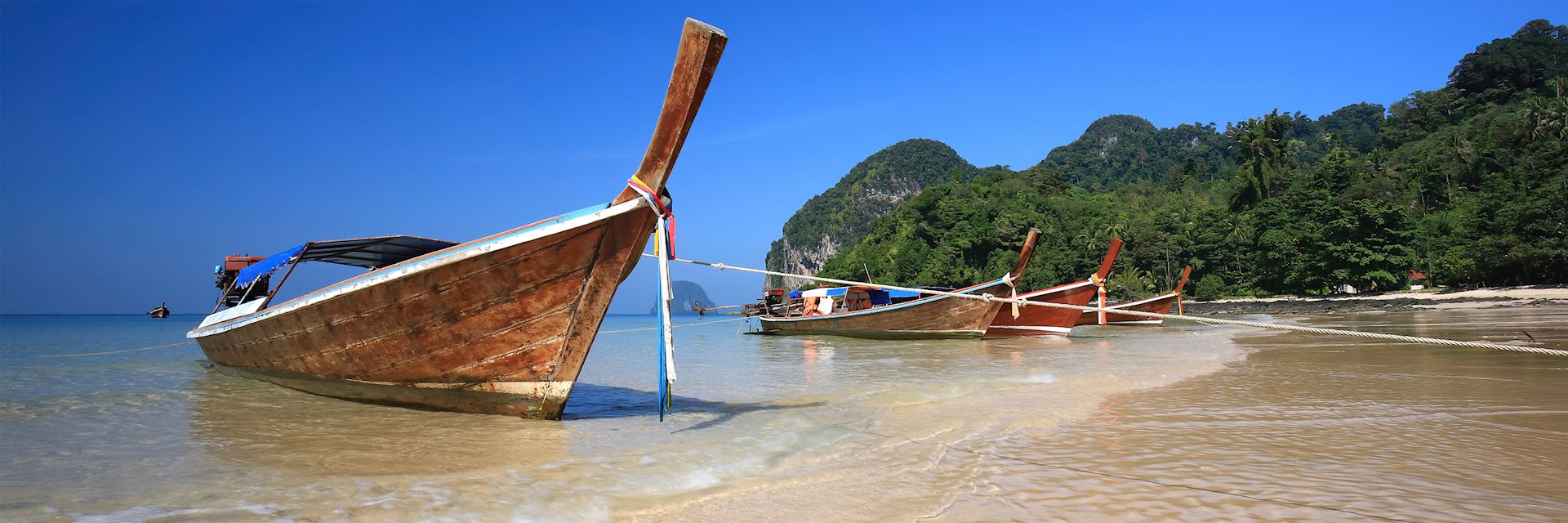Practical Information
Thailand features in the brochures of most mainstream tour operators, and it is Southeast Asia’s most visited country.
Tailor made itineraries
Most sell a simple 'off the shelf' package combining a few nights in Bangkok with one of the more developed beaches. However, we apply the same theory to Thailand that we do to all our destinations, starting from scratch and looking at what the country has to offer each individual traveller.
Fauna and flora
With national parks rich in flora and fauna, mountain ranges with their resident hill tribes, and pristine beaches where local fishermen bring the catch in each day, many parts of Thailand can still be enjoyed in unspoilt tranquillity.
Whether you are looking for adventure, beach or culture we can tailor-make an itinerary, taking you off the beaten track areas to seek the very best hidden resorts and hotels.
Language
Thai is the official language. English is widely spoken throughout the country.
Food and drink
Bursting with mouth-watering flavours of exotic herbs such as lemongrass and kaffir lime, Thai cuisine is certainly one of the highlights of travelling in Thailand. The best cuisine is often found in the local non-descript restaurants, and at the open-air street stalls, where sitting on pint sized plastic stools is the norm.
Local whisky, either Mekhong or Sangthip is worth sampling. The local beer comes in varying strengths. Fruit juices are also worth trying. Coconut milk straight from the shell is available during the harvest season.
Tipping
Tipping for good service is an accepted fact worldwide. It is spreading in Thailand and will always be appreciated but is not part of everyday Thai culture therefore you should not feel it is an obligation. 10% is the going rate in restaurants. At many other hotel restaurants and upmarket eateries this 10% service charge will be added to your bill.
Money and expenses
The Thai currency is the baht. Notes are in denominations of 1000, 500, 100, 50 and 20 baht. Coins are in denominations of Baht 10, 5, 2 and 1 baht and 50 and 25 satangs. However, you will rarely use satangs.
Automatic cash dispensers are widespread, especially in the major cities. Most machines take all credit cards, as well as Cirrus, Plus, Maestro and Solo cards. Visa and Mastercard are widely accepted, as are bank debit cards. Please do remember that many banks charge a fee to use any bank whilst abroad.
Allow about £15 a day for meal and drink expenses, a local beer will normally cost around £1, a two-course lunch around £5 and a two-course dinner around £8, depending on where you choose to eat.
Social conventions and etiquette
Local people and customs
If somebody bows with their hands together (a 'wai') it is polite to do the same in return, unless they are hotel staff, waiters etc, however a 'wai' would also be appreciated by them. Thai people are softly spoken and avoid confrontation. Try to avoid shouting or raising your voice. Public displays of affection such as hugging and kissing are seen to be embarrassing so try to avoid this. If visiting a local person's house always take off your shoes. People in Thailand prefer to dress neatly and in clean clothes and appreciate it when visitors do the same. Thai people are tolerant of most kinds of behaviour, as long as it does not insult their monarchy or religion.
Royal family
Any portrait of the King or any members of the royal family must be treated with a great deal of respect. This extends to currency; if you drop a Thai coin or note, ensure you pick it up. Never stand on a coin or note if you see one on the floor. Furthermore, you must not lick stamps. There will usually be a small sponge available for attaching the stamp to a letter. To celebrate the King's 60 years on the throne, and to show one's love for the King, you will see many Thais wearing yellow t-shirts, particularly on Mondays. Thais are very happy to see 'farang' (foreigners) do the same.
Religious sites, religious items, temples and monks
It is considered rude to show the soles of your feet in Thailand and you must never point your feet toward a Buddha image. Please do not touch anything that may be of religious significance, such as Buddha statues, altars, and burial grounds. Whilst much of Thailand has become accustomed to Western tourists, it is important to dress respectfully when visiting religious sites. Remove shoes and hats before entering a religious building.
Hilltribe visits
If you wish to take photos of hill tribes, it is likely that they will either expect a small monetary donation or for those tribes that deem it bad luck, will ask that you do not photograph them. Please always ask permission before taking a photograph.
Travel Advice
Our country specialists can advise on any safety concerns you may have. For current information, please refer to the Foreign, Commonwealth & Development Office website.
When to go to Thailand
You'll find temperature and rainfall information, together with a month-by-month guide on visiting, on our guide for when to go to Thailand.
More Information
-
Flight Time
11½ hours (Bangkok) -
Recommended Airlines
British Airways, Emirates, Etihad, EVA Airways, Qatar Airways, Thai Airways, Turkish Airlines -
Time Zone
UTC +7
